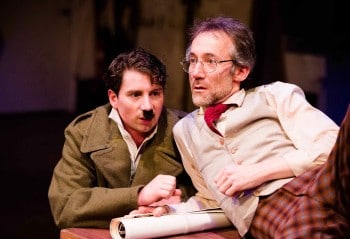Mein Kampf
Mein Kampf, written by Hungarian playwright George Tabori in 1987, examines a moment in history, namely, the existential calm before the onslaught of the Nazi regime – the calm before the storm.

Set in a flophouse in Vienna, it’s the story of Shlomo Herzel, a Jew attempting to write his magnum opus, called Mein Kampf, and quietly trying to survive. Chaos ensues when a young artist attempting to enrol in Vienna’s renowned fine art academy enters; his name is Hitler.
Mein Kampf deals with compassion. It parallels innate humanism with the obsessive and opportunistic features that have come to characterise the figure of Hitler. The work prefigures the historical events to come and maintains a skilled balance between the comic and the tragic. This is achieved through the audience’s insight. We all know what’s going to happen; nonetheless, we laugh at the childlike features of the young Hitler and cry at the compassion and endless optimism of Shlomo.
Between chaos and order, Mein Kampf shifts at times into allegory, a representation of the inability to ‘represent’ the horrors of these moments in history, or perhaps the inability to come to terms with our historical baggage. The space of fortyfive downstairs gives the piece a site-specific feel and merges perfectly with the simplistic set.
It also has some truly spectacular performances. From Glenn Can Oosterom’s raging Hitler who’s riddled with teen-angst, to Steve Gome’s exquisitely slapstick and hilarious Shlomo, who establishes a rapport with the spectators from the moment he enters.
Mention should also go to Stephania Pountney for her excellent portrayal of a pure and innocent virgin heiress and David Kambouris for his incarnation of (possibly?) God. Sarah Bollenberg in her embodiment of Death as a delicate and sensitive soul was masterfully ironic, while Troy Larkin’s monologue towards at the climax of the piece was arresting, affronting, captivating and grotesque.
Mein Kampf is a touching piece that deals with events so embedded in our cultural psyche that their impact and prevailing effect is sometimes forgotten. Director Beng Oh has rendered the script wonderfully, it rings honest and important as it replays our fears and evokes our passions.

